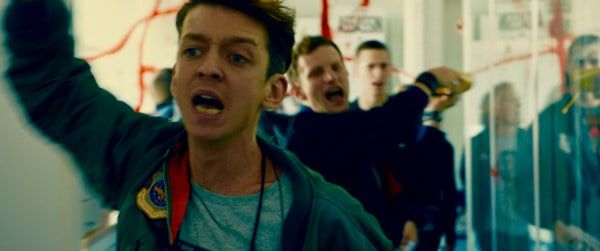Set in an Act-Up AIDS protest group in Paris in the early 1990s, his third feature swings back and forth between scenes of debate and protest and more intimate glimpses of love, grief and communion among the participants. Campillo, born in 1962, joined the group in 1992 and was an active member. He co-wrote and co-edited Laurent Cantet’s 2008 Palme d’Or winner The Class. He credits Cantet for getting him really involved in film after they met in the mid-80s and began to work on each other’s projects. Campillo’s directing credits also include cult classic Les Revenants (also known as They Came Back) which became the source material for the hit TV series, and Eastern Boys which won best film in Venice’s 2013 Horizons section. 120 BPM has lead this year’s César nods, securing 13 nominations including best film, best director and best screenplay with the announcement due on March 2. The popularity of the film came as little surprise. Although ignored by Oscar and the Golden Globes, the film has been a critical and box office success in France where the it has drawn more than 800,000 spectators. Campillo talks in a rush of accented English - he likes the language because he suggests that French is “so dull and monotone” by comparison.
Ricahrd Mowe: How difficult was it to come to grips with a subject that you were so close to?
 |
| Robin Campillo: 'I was sitting in cafes in Paris and I was crying over my laptop. It was really hard at times, but it helped me to put all these things in perspective.' Photo: © Celine Nieszawer |
The other issue was that I had a kind of stage fright because it was such a big deal. I wanted to make a film about this disease from the very start of the epidemic - since 1982, when the talk was all about “gay cancer”. It kind of paralysed me because I wanted to be a director but I had no connections with film. Then I started to write it all down. I wanted to do this film right … when I was writing it I was getting very emotional, which was stupid.
I was sitting in cafes in Paris and I was crying over my laptop. It was really hard at times, but it helped me to put all these things in perspective. All the details are real but the characters are not and it is not exactly what I lived. It is a fiction, really, with a very specific structure. The good thing is that when I was done with this bloody script, you have to go through people, and people take all these emotions, all the sensuality, all the sensations and they take it all out of you. It is like a new collective action that it was 25 years ago. It seemed as if I was recreating Act Up with this film.
RM:How do you like to create - you mentioned sitting in cafes rather being in solitary isolation?
RC: Yes, that’s because I am basically lazy, I don’t like the feeling that I am working. In Paris, it is very easy to walk around and I think when I walk. So I write with my legs. There comes a point when you have to dream your film rather than just sitting in front of a computer screen. I like to have the feeling that I am not working. Of course, there are times when I have to work seriously. Otherwise I like to be surrounded by people and noise.
 |
| Robin Campillo: 'Cinema is all about incarnation and I was very moved because they were all so touched by the script' Photo: © Celine Nieszawer |
RM: Can you explain the success of the film after its debut at the Cannes Film Festival. It is, after all, dealing with something in the past yet it seems to strike a chord today.
RC: It touches people of my age - gay men who went through this epidemic so they are really aware of it. But I have also noticed that the current generation of gay men who are in their twenties are also very moved by the political debate. It was a debate that occurred before the internet and people had to meet in the flesh to take forward these political actions. It was so different. I am a little bit conservative about the internet. People put radical texts on things like Facebook and they are insulting each other to create some kind of stupid electricity. It is like putting things in outer space. That does not help with anything because people do not meet face to face. People think the internet is a very democratic experience but it is not. I think we are still like cavemen when confronted with the internet.
When young people see the film (I can only talk about France where I presented many of the screenings) they become nostalgic for something they did not know. Before the agitators in the film could confront the laboratories and the politicians they had to confront each other, and that creates politics. In France, there was no such a thing as a gay community. In the end, it is just people and they have the same perception of reality. We were living this epidemic in the Eighties on our own - everyone was on their own. Then someone created Act Up in France in the same format as the New York initiative and it was like a window had opened. Reality is the best metaphor of itself. When we all met we were able to have all these debates. We agreed about the crucial things, but there were a lot of things we did not agree about it. And that was interesting.
RM: How did you lead your young actors in to this world - in particular Nahuel Pérez Biscayart as Sean and Arnaud Valois as Nathan?
 |
| Arnaud Valois as Nathan in 120 Beats. Robin Campillo: Arnaud has this incredible ability, because he looks so much in love' Photo: © Celine Nieszawer |
Cinema is all about incarnation and I was very moved because they were all so touched by the script. Here they were in a film that was just as important to them. Arnaud has this incredible ability, because he looks so much in love. That’s a very nice thing to say, but it’s not so easy to do. He’s amazing. I told him and Nahuel that we won’t see your genitals so feel free to play this as though you were really making love. They had this commitment to the film and in the scene. The whole group were very strong and after the shooting they went out to have drinks together. It was like recreating Act-Up from 25 years ago with all these young people. It was kind of tribute to my own youth.
RM: What’s on the horizon for you?
RC: I want to work on a science fiction film for which I had the idea many years ago. Obviously something completely different!.
120 Beats at Glasgow International Film Festival on Monday, February 26 at 7.45pm and Tuesday, February 27 at 1pm GFT 1
The film will be released in the UK and Ireland on April 6, in Denmark on March 8, Norway on March 23, Japan on March 24 and Poland on May 11.
Richard Mowe interviewed Robin Campillo at the Unifrance Rendez-vous with French Cinema in Paris






















